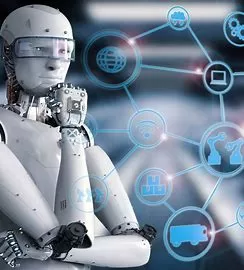Exploring the Benefits of AI-Powered Quantum Computing
The potential of quantum computing is immense, and the development of artificial intelligence (AI) has enabled us to explore its benefits in unprecedented ways. AI-powered quantum computing is a powerful tool that can be used to solve complex problems and unlock new possibilities.
Quantum computing is based on the principles of quantum mechanics, which allow for the manipulation of information at the atomic level. This enables quantum computers to process data much faster than traditional computers, making them ideal for solving complex problems. AI-powered quantum computing takes this a step further by using AI algorithms to optimize the performance of quantum computers.
The combination of AI and quantum computing can be used to solve problems that are too complex for traditional computers. For example, AI-powered quantum computing can be used to analyze large datasets and identify patterns that would otherwise be impossible to detect. This can be used to develop new drugs, improve the accuracy of medical diagnoses, and even predict the stock market.
AI-powered quantum computing can also be used to create new materials and products. By using AI algorithms to optimize the performance of quantum computers, scientists can create materials with unique properties that can be used in a variety of applications. This could lead to the development of new materials for use in aerospace, automotive, and medical industries.
Finally, AI-powered quantum computing can be used to create new algorithms that can be used to solve complex problems. By using AI algorithms to optimize the performance of quantum computers, scientists can create algorithms that can solve problems that are too complex for traditional computers. This could lead to the development of new algorithms for use in a variety of fields, such as finance, healthcare, and cybersecurity.
In conclusion, AI-powered quantum computing is a powerful tool that can be used to solve complex problems and unlock new possibilities. By combining AI algorithms with quantum computing, scientists can create materials with unique properties, develop new drugs, and create new algorithms that can be used to solve complex problems. The potential of AI-powered quantum computing is immense, and its development is sure to revolutionize the way we approach problem-solving.

The Impact of AI on Quantum Computing Performance
The impact of artificial intelligence (AI) on quantum computing performance is an increasingly important topic in the field of quantum computing. AI has the potential to revolutionize the way quantum computing is used and to significantly improve its performance.
Quantum computing is a form of computing that uses quantum-mechanical phenomena, such as superposition and entanglement, to perform calculations. It has the potential to solve problems that are intractable for classical computers, such as simulating complex quantum systems or solving certain optimization problems. However, quantum computing is still in its infancy and has yet to reach its full potential.
AI can be used to improve the performance of quantum computing in several ways. First, AI can be used to optimize the parameters of quantum algorithms, such as the number of qubits used and the number of gates in a circuit. This can help to reduce the amount of time and resources needed to run a quantum algorithm. Second, AI can be used to develop new quantum algorithms that are more efficient than existing ones. Finally, AI can be used to identify and correct errors in quantum circuits, which can help to improve the accuracy of quantum computations.
In addition to improving the performance of quantum computing, AI can also be used to develop new applications for quantum computing. For example, AI can be used to develop algorithms that can be used to solve complex problems in areas such as finance, healthcare, and logistics. AI can also be used to develop quantum-based machine learning algorithms that can be used to identify patterns in large datasets.
Overall, AI has the potential to revolutionize the way quantum computing is used and to significantly improve its performance. By optimizing quantum algorithms, developing new algorithms, and identifying and correcting errors, AI can help to make quantum computing more efficient and accurate. In addition, AI can be used to develop new applications for quantum computing, which can help to expand its potential uses.

How AI is Transforming Quantum Computing Research
The development of quantum computing has been a major focus of research for decades, and the potential of this technology is immense. As the field of quantum computing continues to evolve, artificial intelligence (AI) is playing an increasingly important role in the research and development of this technology. AI is being used to help researchers better understand the complexities of quantum computing, and to develop new algorithms and techniques that can be used to improve the performance of quantum computers.
AI is being used to help researchers better understand the behavior of quantum systems. By using AI to analyze data from experiments, researchers can gain insights into the behavior of quantum systems that would otherwise be difficult to obtain. AI can also be used to develop new algorithms and techniques that can be used to improve the performance of quantum computers. For example, AI can be used to develop algorithms that can be used to optimize the performance of quantum computers, or to develop techniques that can be used to reduce the amount of time needed to run a quantum algorithm.
AI is also being used to help researchers develop new applications for quantum computing. By using AI to analyze data from experiments, researchers can identify potential applications for quantum computing that would otherwise be difficult to identify. AI can also be used to develop new algorithms and techniques that can be used to improve the performance of quantum computers for specific applications. For example, AI can be used to develop algorithms that can be used to optimize the performance of quantum computers for specific applications such as cryptography or machine learning.
Finally, AI is being used to help researchers develop new hardware for quantum computing. By using AI to analyze data from experiments, researchers can identify potential hardware designs that would otherwise be difficult to identify. AI can also be used to develop new algorithms and techniques that can be used to improve the performance of quantum computers for specific hardware designs. For example, AI can be used to develop algorithms that can be used to optimize the performance of quantum computers for specific hardware designs such as superconducting qubits or trapped ions.
In summary, AI is playing an increasingly important role in the research and development of quantum computing. AI is being used to help researchers better understand the behavior of quantum systems, to develop new algorithms and techniques that can be used to improve the performance of quantum computers, and to develop new applications and hardware for quantum computing. As the field of quantum computing continues to evolve, AI will continue to play an important role in the research and development of this technology.

The Role of AI in Quantum Computing Security
Artificial intelligence (AI) is playing an increasingly important role in quantum computing security. Quantum computing is a revolutionary technology that has the potential to revolutionize the way we process data and solve complex problems. However, it also presents unique security challenges due to its reliance on quantum mechanics. AI can help to address these challenges by providing enhanced security measures and improved detection of malicious activity.
Quantum computing relies on the principles of quantum mechanics to process data and solve complex problems. This technology has the potential to revolutionize the way we process data and solve complex problems, but it also presents unique security challenges. For example, quantum computers are vulnerable to attacks from malicious actors who can exploit the quantum nature of the system to gain access to sensitive data.
AI can help to address these security challenges by providing enhanced security measures and improved detection of malicious activity. AI can be used to detect and respond to malicious activity in quantum computing systems. AI can also be used to develop secure protocols for quantum computing systems, such as quantum key distribution and quantum cryptography. AI can also be used to develop algorithms that can detect and respond to malicious activity in quantum computing systems.
AI can also be used to develop secure protocols for quantum computing systems, such as quantum key distribution and quantum cryptography. These protocols can help to protect data from malicious actors by ensuring that only authorized users have access to the data. AI can also be used to develop algorithms that can detect and respond to malicious activity in quantum computing systems. These algorithms can help to detect and respond to malicious activity in a timely manner, allowing for quick responses to potential threats.
In conclusion, AI is playing an increasingly important role in quantum computing security. AI can be used to develop secure protocols for quantum computing systems, detect and respond to malicious activity, and develop algorithms that can detect and respond to malicious activity in a timely manner. AI can help to ensure that quantum computing systems are secure and protected from malicious actors.
The Future of AI-Driven Quantum Computing Applications
The potential of quantum computing applications driven by artificial intelligence (AI) is immense. AI-driven quantum computing applications are expected to revolutionize the way we interact with technology and the world around us. AI-driven quantum computing applications are expected to be used in a variety of fields, including healthcare, finance, and transportation.
AI-driven quantum computing applications are expected to be more powerful than traditional computing applications. This is because quantum computing applications are able to process data faster and more accurately than traditional computing applications. AI-driven quantum computing applications are also expected to be more efficient, as they are able to process data more quickly and accurately than traditional computing applications.
AI-driven quantum computing applications are expected to be used in a variety of fields. In healthcare, AI-driven quantum computing applications are expected to be used to diagnose and treat diseases more accurately and quickly. In finance, AI-driven quantum computing applications are expected to be used to analyze financial data more accurately and quickly. In transportation, AI-driven quantum computing applications are expected to be used to optimize routes and schedules more accurately and quickly.
AI-driven quantum computing applications are also expected to be used in a variety of other fields, such as manufacturing, energy, and security. In manufacturing, AI-driven quantum computing applications are expected to be used to optimize production processes more accurately and quickly. In energy, AI-driven quantum computing applications are expected to be used to optimize energy usage more accurately and quickly. In security, AI-driven quantum computing applications are expected to be used to detect and prevent cyberattacks more accurately and quickly.
The potential of AI-driven quantum computing applications is immense. AI-driven quantum computing applications are expected to revolutionize the way we interact with technology and the world around us. AI-driven quantum computing applications are expected to be used in a variety of fields, including healthcare, finance, transportation, manufacturing, energy, and security. AI-driven quantum computing applications are expected to be more powerful, efficient, and accurate than traditional computing applications. As such, AI-driven quantum computing applications are expected to have a major impact on the future of technology.







